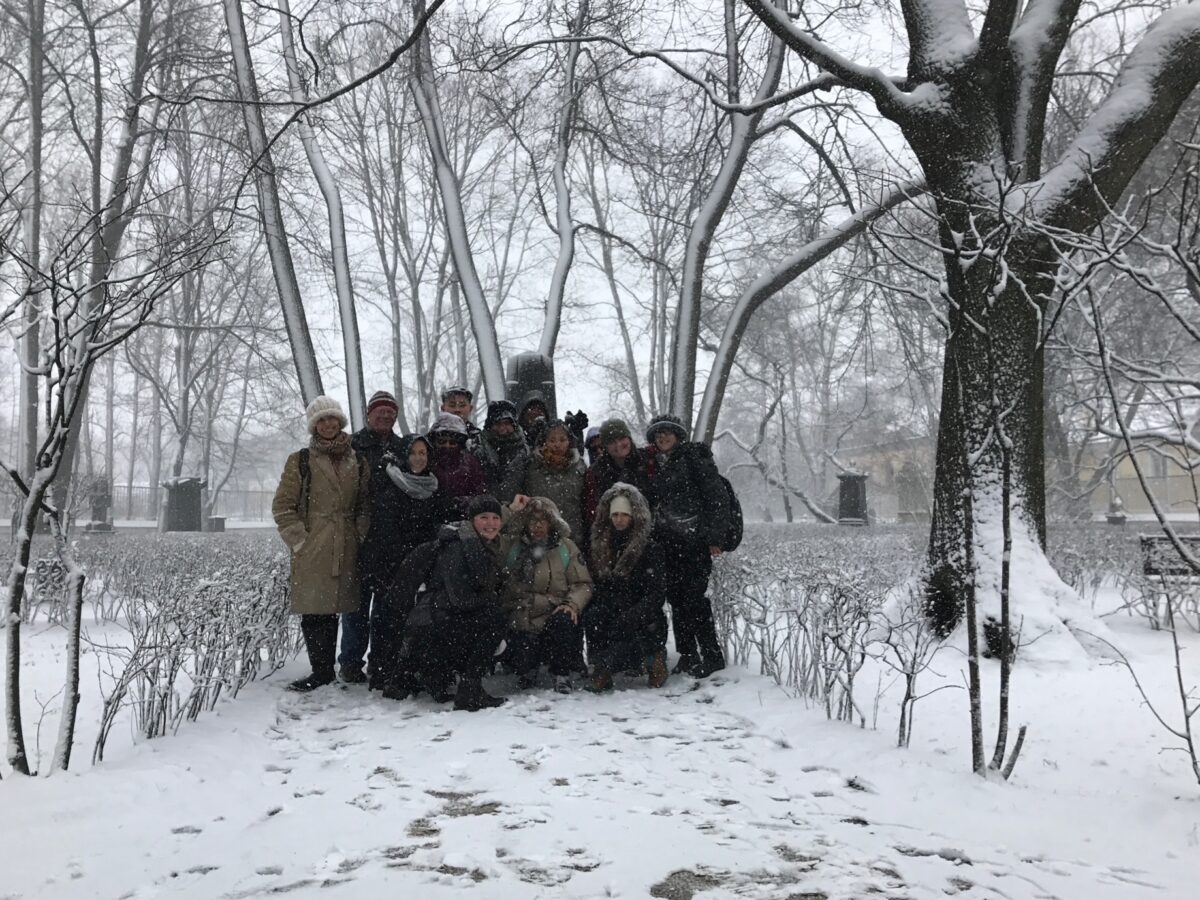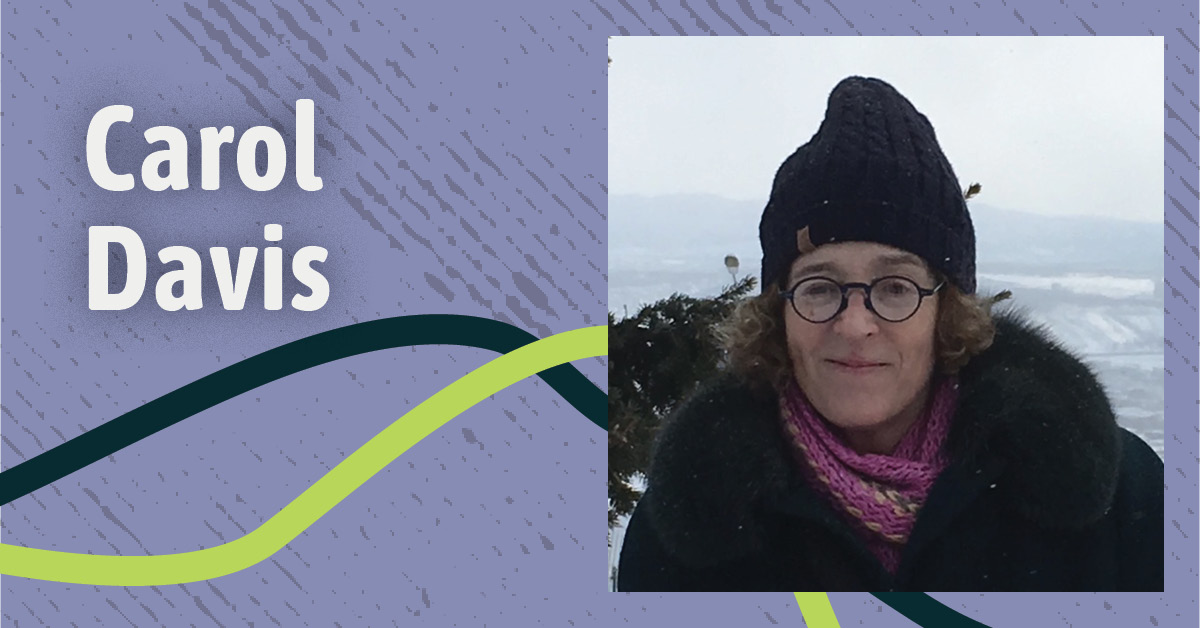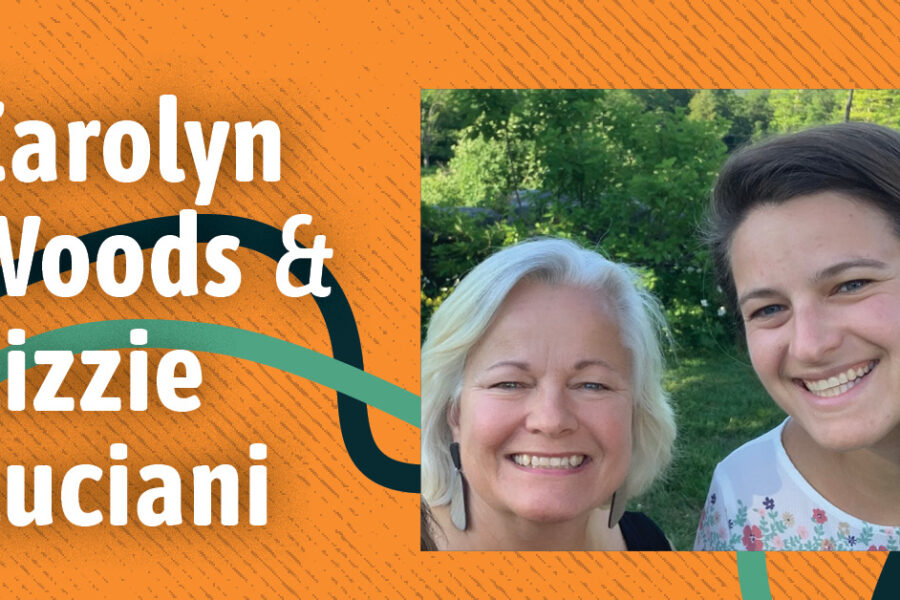The poet Carol Davis finds her inspiration when immersed in the unfamiliar. She teaches now in the bachelor’s program at Antioch Los Angeles. Her classes range from multi-genre workshops to a course exploring the changing landscape of contemporary literature in North America. This breadth of topics reflects her own search for revelation across the world.
Her work has led her from Nebraska (where she held a National Park Service Writer-in-Residence Fellowship) to Berlin (where she was awarded the Barbara Deming Feminist Artist Grant) and beyond. There’s one place she’s connected to most profoundly though. “I keep saying I’m going to stop writing about Russia,” she says, “and I keep writing about Russia.”
It may seem obvious that someone with Davis’s background studying Russian Literature and Language would end up there, but she took a circuitous route. Upon completing her masters in Slavic Languages and Literatures at the University of Washington, she worked as a professional dancer, as a book editor, in refugee organizations, and with English Language Learners before finding her way to poetry and applying for her first Fulbright, in 1996, to both write and teach in St. Petersburg, Russia.
Davis has now received a third Fulbright Award, which will support her traveling to the country for her twelfth time.
To Siberia with a Pen
This third award came as a surprise. Davis believed it was only possible to receive two, so applying again wasn’t on her radar. However, she had long served as a volunteer application reader for the Fulbright program. That’s where she learned there was a new opportunity for prior recipients of the award to apply yet again. Characteristically, she went for it.
This Specialist Grant will find Davis working at a small university in the Sakha Republic in Siberia. Although her previous Fulbrights centered on teaching and writing, this time will be spent primarily working on curriculum development in the humanities. Davis explains that Liberal Arts programs in Russia are facing the same decline we see in the United States, and she hopes to bring new ideas for teachers and learners.
This long-awaited trip has been postponed many times and Davis is still in Los Angeles waiting for her chance to go today. The trip, originally planned for September 2021, was rescheduled due to COVID-19. The continued high rates of infection left Davis nervous about her new plan to travel to Siberia in April, but the decision was taken out her hands—the Fulbright program in Russia is shut down because of the political tensions with Ukraine. Davis is hopeful she’ll make the trip by next September, a year after her original plan. “As soon as it reopens,” she says, “I’ll be scheduled to leave.
An Unlikely Candidate
Davis’s first Fulbright, back in 1996, also came as a surprise to her, “I’m absolutely not the poster child for a Fulbrighter,” Davis explains. “On top of that, I had three little kids I was bringing with me.” However, it was just that that had helped convince her to apply. She wanted her children to experience living in another country, something she had the opportunity to do as a child. “You sort of recognize things about yourself, living in another culture,” Davis says.
Comparing herself to other people applying, she says, “They were all coming from Ivy League schools, and I was coming from a community college.” Her application seemed doomed. “I wasn’t even teaching at the time,” she says, “[and] I applied in creative writing, which is impossible.” But while she was putting her application together, she attended a lecture in LA and met a person who worked at Petersburg Jewish University. They invited her to teach there and this gave her a connection to a host University, “which really made me stand out.”
Davis’s career is marked by these seemingly improbable outcomes. In 2005 she applied for her second Fulbright. It’s uncommon to get two Fulbrights in the same country, let alone the same city, but “they made a gamble, and for both of us it paid off,” Davis says.
It was during this second Fulbright that she wrote her book, Into the Arms of Pushkin: Poems of St. Petersburg. It chronicles the ten years she spent traveling between the United States and Russia. The publication of this book pleased the Fulbright committee, both by the fact that she wrote it about her Fulbright experiences—and because it was a critical hit. She says that “they were very, very happy because it won the T.S. Eliot Prize.”

Taking Chances
Winning this prize is another example of Davis putting herself into the world and being met with unlikely results. “I submitted it to the T.S. Eliot, and didn’t submit it anywhere else,” she explains. “And I won it.” This openness to risk seems to be an understated hallmark for the writer that has led to many opportunities.
One of these small acts of bravery led her to a mentorship that shaped her prize-winning manuscript. “I wasn’t brave in my twenties,” Davis said. But she felt ready to start being brave when she approached the celebrated poet Brigit Pegeen Kelly at a reading in the early 2000s. She introduced herself. “I said I was on my way to Russia and I was going to teach her work,” she explains. The older poet was happy to talk with Davis, and they made a connection.
Many months later, when she returned from St. Petersburg (where she had taught Pegeen Kelly’s poems in a seminar on contemporary American poetry), Davis found herself running into a wall as she tried to figure out how to order the poems that she was pulling together into the collection that became Into the Arms of Pushkin: Poems of St. Petersburg.
“When I was putting together the manuscript, I decided to be brave,” explains Davis. So she emailed Kelly and asked if she would be willing to help. Davis was surprised when the more prominent writer agreed. “It was huge for me,” Davis says. The two women shifted the order of the poems in the book over a series of correspondences. After this key assistance, the book ended up winning the T.S. Eliot Prize and was published by Truman State University Press.
In seemingly serendipitous connections with other writers, by winning a prestigious poetry prize, and with a rare third Fulbright award, Davis has cultivated a writing career based on an acceptance of risk. This willingness to take chances, to reach out to individuals and institutions, shows how the briefest connections can shape our lives and lead to unexpected opportunities.




